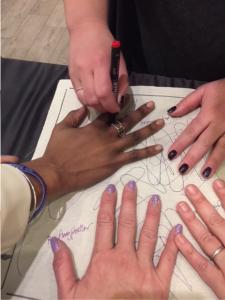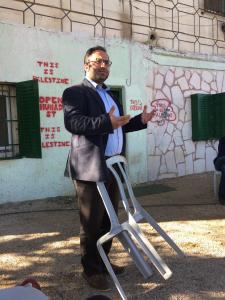As you read the following you will think I am pulling your leg. Not so. Here’s the link to the LA Times for your thoughtful perusal.
And, please keep your “excited murmurs” to a minimum, if at all possible.
By Stephanie Simon
(c) 2007, Los Angeles Times
FORT WORTH, Texas — Equal but different.
You hear that a lot on the lush green campus of Southwestern Baptist
Theological Seminary.
God values men and women equally, any student here will tell you.
It’s just that he’s given them different responsibilities: Men make
decisions; women make dinner.
This fall, the internationally known seminary — a century-old
training ground for Southern Baptists — began reinforcing those
traditional gender roles with college classes in homemaking. The
academic program, open only to women, includes lectures on laundering
stubborn stains and a lab in baking chocolate-chip cookies.
Philosophical courses such as “Biblical Model for the Home and
Family” teach that God expects wives to submit graciously to their
husbands’ leadership. A model house, to be completed by next fall,
will allow women to get credit toward bachelor’s degrees by learning
how to set tables, sew buttons and sustain lively dinner-time
conversation.
It all sounds wonderful to sophomore Emily Felts, 19, who signed up
as soon as she arrived on campus this fall.
Several relatives have told Felts that she’s selling herself short.
They want her to become a lawyer, and she agrees she would make a good
one. But that’s not what she wants to do with her life.
More to the point, it’s not what she believes God wants of her.
“My created purpose as a woman is to be a helper,” Felts said firmly.
“This is a college education that I can use.”
Seminary President Paige Patterson and his wife, Dorothy — who goes
by Mrs. Paige Patterson — view the homemaking curriculum as a way to
spread the Christian faith.
In their vision, graduates will create such gracious homes that
strangers will take note. Their marriages will be so harmonious, other
women will ask how they manage. By modeling traditional values, they
will inspire friends and neighbors to read the Bible and then,
perhaps, to follow the Lord.
“I’m personally going to teach the course in table manners,” Paige
Patterson said, moments after sneaking scraps of poached chicken off
his lunch plate for his black Labrador, Noche.
His wife shook her head affectionately.
“Oh my,” she said, in her gentle Southern lilt. “We’ll have to pray
for some help with that.”
So far, just eight of the 300 students in the seminary’s
undergraduate program are enrolled in the homemaking concentration,
which is similar to a major and counts toward a bachelor of arts in
humanities. Many more women, including graduate students and wives of
seminarians, study traditional gender roles in courses such as “Wife
of the Equipping Minister.” On a recent evening, more than 50 women —
some in sloppy sweats, others in prim sweater sets — pulled out
notebooks as class opened with student presentations. One woman talked
about her hobby of cross-stitching. Another showed how she uses the
Internet to track grocery coupons.
Laney Homan, 30, drew excited murmurs with her talk on meal planning,
featuring a recipe for a sure-fire “freezer pleaser” — a triple batch
of meatloaf (secret ingredient: oatmeal). Thanks to a computerized
system for generating grocery lists, Homan said, “I’ve actually
trained my husband to shop for me.”
Laughing, she threw her palms toward the heavens and added: “Praise Jesus!”
For the rest of the nearly three-hour class, guest lecturer Ashley
Smith, the wife of a theology professor, laid out the biblical basis
for what she calls “the glorious inequalities of life.”
Smith, 30, confided that she sometimes resents her husband for
advancing his career “while I’m changing diapers and getting poop all
over me.”
But then she quoted from Ephesians: “Wives, submit to your own
husbands, as to the Lord.” And from Genesis: God created Eve to be a
“suitable helper” for Adam.
“If we love the Scripture, we must do it,” said Smith, who gave up
her dreams of a career when her husband said it was time to have
children. “We must fit into this role. It’s so much more important
than our own personal happiness.”
More moderate Southern Baptists disagree, and they counter with their
own biblical references. When Jesus dined at the home of two sisters,
he praised Mary, who spent the evening studying his teachings, above
Martha, who did chores. Elsewhere in the New Testament, the apostle
Paul writes that “there is neither male nor female: for ye are all one
in Christ.”
“We’re confusing 1950s culture with the teaching of Scripture,” said
Wade Burleson, a Southern Baptist pastor in Oklahoma. “I nowhere see
where the Lord Jesus places limitations on the role of women in our
culture.”
One of the largest Southern Baptist seminaries, Southwestern draws
students from around the world to its 200-acre campus, fringed by
trees that set it apart from a rundown neighborhood in south Fort
Worth. Nearly three-quarters of the campus’ 3,000 students are men,
and many are older, having felt a call to ministry mid-life. The
seminary caters to their families, with shaded sidewalks for strollers
and a duck pond much beloved by toddlers.
In the undergraduate college — which opened two years ago — every
student must take Greek or Latin, plus seminars that explore works by
Sophocles and Shakespeare, Machiavelli and Marx, Darwin and
Dostoyevsky. The other day, Sarah Babler, an 18-year-old freshman
enrolled in the homemaking program, was writing a paper on the Trojan
War for one class. For another, she was parsing Proverbs 31 — on the
attributes of a godly woman.
She and others in the homemaking program devote about 20 percent of
their classroom time over four years to courses such as “Clothing
Construction,” “Meal Preparation ” and “Value of a Child.”
Such classes went out of style at most secular colleges a
half-century ago, but undergraduate Quincy A. Jones said he considers
them essential in a world where too many families are fractured and
unhappy. Jones, who is married and has five children, said he would
encourage his teenage daughter to study homemaking.
“It’s not limiting at all,” said Jones, 35. “It prepares women for a
variety of roles.”
Paige Patterson agrees. His goal is to nurture well-rounded women who
can do more than press a perfect crease: “We’re equipping them to do
home-schooling.”
An avid hunter who wears cowboy boots to chapel, Patterson, 64, is a
powerful — and polarizing — figure within the Southern Baptist
Convention.
During his tenure as convention president in the late 1990s, Southern
Baptists banned women from becoming pastors and called on every wife
“to submit herself graciously to the servant leadership of her
husband.” Last year, Patterson fired a female professor of biblical
languages; he interprets the Bible as prohibiting women from teaching
men theology.
Many moderates have left the Southern Baptist Convention in recent
years — including former President Carter — but it remains the
largest Protestant denomination, claiming more than 16 million
believers and 42,000 churches.
The conservative leadership plans to offer homemaking at other
seminaries. Here at Southwestern, the classes are proving popular with
an array of women.
Donella Cecrle, 36, spent years in the corporate world, traveling to
sell computer software — and far out-earning her husband, Andy.
Subservience wasn’t in her vocabulary. Neither was homemaking. Most
days, dinner was takeout from the Mexican restaurant down the street
or a quick meal at IHOP.
But about six years ago, the couple worked through a low point in
their marriage with prayer and Bible study. Slowly, Cecrle said, she
began to realize that she needed to change. When Cecrle became
pregnant, she left work for good and now stays home with their two
preschool-age children.
In what time she can spare, Cecrle works toward a bachelor’s degree
at the seminary. She started this semester with a homemaking course,
which Dorothy Patterson, 63, teaches at her own dining-room table
(artfully decorated with sprigs of autumnal berries and curls of
pumpkin-hued ribbon).
Cecrle credits Patterson’s lectures on God’s vision of womanhood with
helping her embrace her role as helper — and restrain her instincts
to take charge. “I have to be able to shut my mouth,” she said.
Many male graduate students at Southwestern take a class in masculine
leadership, where they are admonished to put their wives’ needs before
their own even as they flex their authority. But there’s no broader
curriculum on a husband’s role, leading Dusty Deevers, 30, to wonder
what he and other male students might be missing. Labs on mowing the
lawn? Trimming hedges? Balancing a checkbook? “Many, many men would be
well-served by something like that,” Deevers said.
Andy Cecrle, 42, takes it one step further: He would like to see a
homemaking class for men, or at least a survival boot camp. He happens
to know his way around the house and is proud that he changes his
children’s diapers. But he knows many guys don’t have a clue how to
even start the washer.
“What if my wife is sick and my kids need clean clothes? It may not
hurt to have some basic tips,” Cecrle said. Then he added cautiously:
“A lot of people would take great exception to what I’m saying.”
Felts is one of them. The point of taking college-level homemaking,
she said, is to ensure that her husband won’t feel that he has to darn
a sock or do the laundry. Those are her jobs.
If she doesn’t marry, that’s fine, too; she’ll pursue a master’s in
education — and use it to teach homemaking.
“I’m not one of those out to rebel, out to be my own woman types,” she said.
Home-schooled by her mother, Felts is poised, articulate and
unfailingly polite; she calls her elders “ma’am” and expresses
surprise with a genteel “Goodness!” She commutes to college from her
family’s Fort Worth home, so she has plenty of opportunity to work on
her helper skills. She dusts, mops and vacuums. She often makes dinner
for her family: Noodles from scratch or quiche with a homemade crust.
Does she enjoy these tasks? Except for vacuuming, absolutely, Felts
said. And if she didn’t?
“It really doesn’t matter what I think,” Felts said. “It matters what
the Bible says.”











